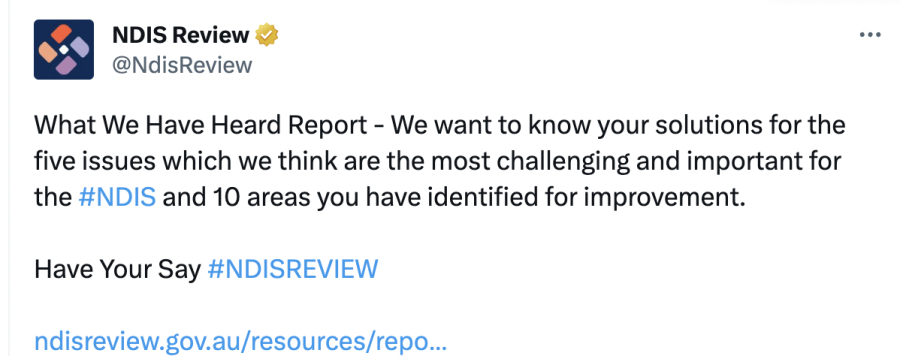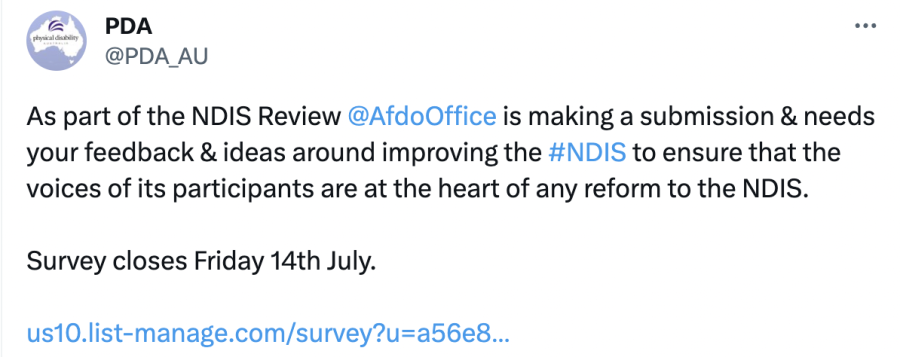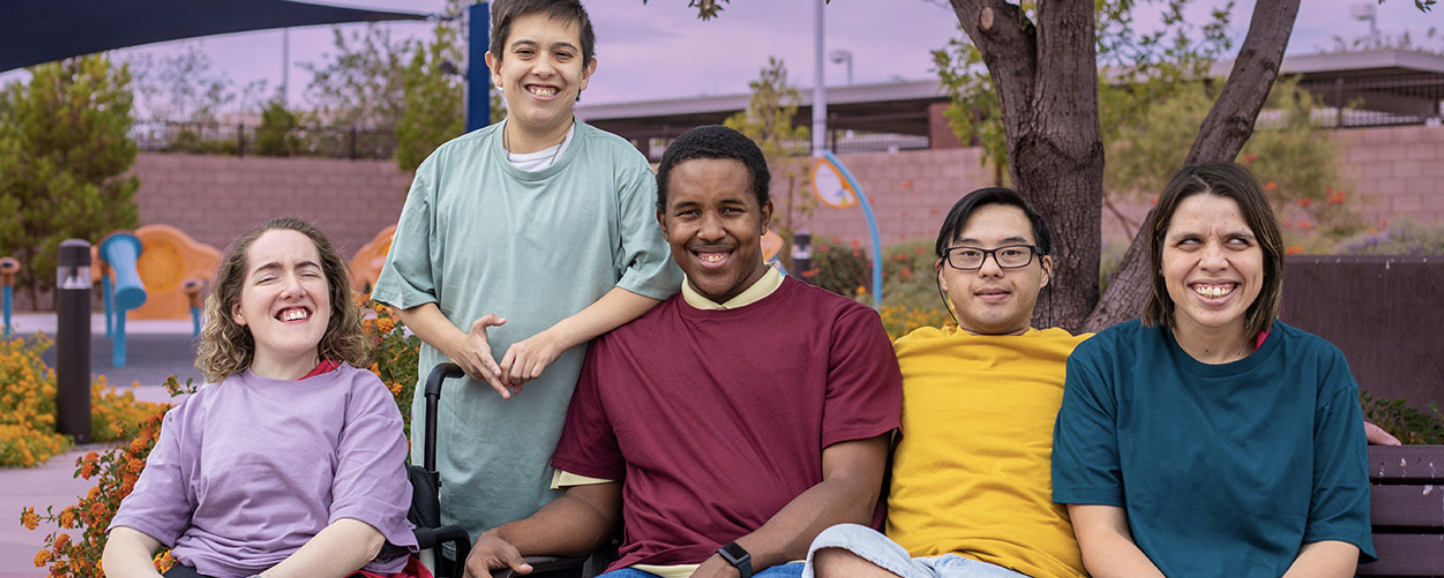Introduction by Croakey: The health and education sectors will need to step up if we are to ensure that the National Disability Insurance Scheme (NDIS) is both sustainable and transformative for people with disability.
And local expertise and responses are urgently needed for remote Aboriginal and Torres Strait Islander communities where it is “deeply shocking” that so little has been delivered since the NDIS was launched.
These are strong messages from founding NDIS chair Bruce Bonyhady, who is co-chairing the Independent Review Panel set up last year by NDIS Minister Bill Shorten to look at the design, operations and sustainability of the NDIS, and at ways to make the market and workforce more responsive, supportive and sustainable.
The NDIS Review panel released its interim report last week, just ahead of the 10th anniversary of the NDIS and amid ongoing concerns for its future, both in the way it operates and how it is funded, as Marie McInerney reports below.
It is asking NDIS participants, their families and carers, representative organisations, workers and providers, and the wider disability community to respond to the interim report via the Have Your Say online submission platform, which includes a survey.
Croakey readers might be interested to attend a community discussion and Q&A on “all things NDIS” with Shorten, hosted by independent MP Dr Monique Ryan, on 19 July from 7-8:30pm. The session will also be live-streamed here.
Marie McInerney writes:
The NDIS Review’s interim report opens with a well-chosen quote from an NDIS participant’s family member:
I love the NDIS. It has been a life saver for my family but not without stress, anxiety… and seeing my family at breaking point. Every year we go through the same mundane crap and have to fight the fight, not knowing what the outcome will be.”
It’s a verdict echoed by academics Professor Helen Dickinson and Dr Sophie Yates in their overview on the past ten years, writing that “we already know the scheme has been transformative for some, intensely disappointing for others and the subject of controversy”.
And it was emphasised by the Independent Review Panel co-chair Bruce Bonyhady, the inaugural chairman of the NDIS, on the release last week of the ‘What we have heard’ interim report.
Bonyhady told RN Breakfast there was no doubt the NDIS is transforming people’s lives, but he said it was “inevitable when you introduce a scheme of this magnitude that not every aspect of it works as intended”.
He told the ABC he was confident the NDIS can be made both sustainable and equitable, but said it will require more than the scheme itself to change, saying it is “also shining a light into sustained disadvantage in our community”.
He pointed to the poorer outcomes for people with disability in the health and education systems, saying the NDIS cannot be expected to “do the heavy lifting” for everyone else.
“We need to think much more holistically about the NDIS…as part of an overall ecosystem which builds social and community capital….[but also] works with other parts of government, with the health system, with the education system, so people with disability are properly supported,” he told the ABC.
“These other systems have to step up if this scheme is going to be both sustainable and equitable and fair,” he said.
You can listen to the full interview here and read a recent Queensland speech which laid out many of the issues in more detail and spoke of the impact of “systemic failure” in the scheme.
In his speech, Bonyhady said members of the Review had spent a week visiting the Northern Territory last month, spending time with Aboriginal and Torres Strait Islander communities in Darwin, Maningrida, Groote Eylandt, Tennant Creek, Ali Curung and Alice Springs.
The lack of impact from the NDIS over eight years, especially in remote communities, “is not just disappointing; it is deeply shocking that so little has been achieved,” he said, declaring that “a purely market-based approach is not working”.
Bonyhady said the NDIA is still flying or driving support workers into and out of remote communities, rather than building the NDIS community-by-community, training local Aboriginal and Torres Strait Islander people to be support workers, allied health assistants, recovery coaches and peer workers.
This would not only be more cost effective, “it would also boost remote economies, deliver culturally-safe services, and help Close the Gap,” he said.
Bonyhady said the Review had heard so far from “thousands and thousands” of people with disability, who identified five key areas (see below) “as the most challenging and needing the biggest shifts”.
The interim report asks a series of questions in response to those issues, urging people to submit their feedback ahead of the final report which is due by October.


1. Why is the NDIS an oasis in a desert?
The report says the NDIS was never designed to support all people with disability but that community supports for all people with disability, as originally proposed, “have not been delivered”.
“As a result, the NDIS has become an oasis in the desert. This has had a significant impact on the cost of the scheme. It has also left people who are not in the NDIS without support. This is deeply unfair.”
The review asks people to respond to the following questions:
What supports from governments, business and the community are missing?
Does the original vision need to be rethought because people with disability do not neatly fit into silos or ‘tiers’?
2. What does ‘reasonable and necessary’ mean?
The report notes that the NDIS funds ‘reasonable and necessary’ supports for participants but that ‘reasonable and necessary’ is poorly defined – an unresolved issue that is the cause of many of the scheme’s challenges, it says.
“This includes stressful, time-consuming and poor planning experiences, inconsistent and inequitable decisions about funding and disputes between participants and the Agency.”
It asks for feedback on how best to make the definition clear and put it into practice, asking:
What frameworks or processes could help make this fundamental change?
3. Why are there many more children in the NDIS than expected?
The review reports that many more young children are entering the scheme than was expected, for a number of reasons, including that original estimates were too low but also because of a lack of support for children with disability in mainstream settings.
“With so few supports outside the NDIS, it is not surprising that parents are fighting to get their children with developmental concerns, delays and disabilities into the NDIS,” it says.
But the review panel found that best practice does not always apply to early intervention, that support for families has largely been ignored, and there’s been a focus on diagnosis rather than support needs.
“These failings, along with the lack of support for children outside the NDIS, means children are not always getting good outcomes. It is also putting pressure on the sustainability of the scheme,” the report says, asking:
What is the best way to support children with disability and families?
4. Why aren’t NDIS markets working?
In a damning finding, the review says that the so-called markets in the NDIS have not worked as originally imagined and that competition “has not produced improved quality, innovation or diversity of services for all participants in all locations”.
Especially in remote areas, the limited availability or poor quality of services means that in practice participants don’t really have choice or control – which is meant to be at the heart of the NDIS mission.
“The market system has not driven inclusion and helped to nurture connections with family, friends and community,” it says.
“In fact, sometimes the exact opposite has occurred. These failings are undermining outcomes for participants and contributing to increasing scheme costs. In addition, not only do we not know whether participants are getting good outcomes such as employment and a good life; but we also don’t know the relative quality of the supports they receive.”
It asks:
What needs to be done to ensure NDIS markets serve the interests of people with disability, rather than the other way round? Where will markets not work? How can scheme help participants become more independent; not more dependent?
5. How do we ensure that the NDIS is sustainable?
The review doesn’t dig deep on this billion dollar question or debate over what sustainable might look like and for whom, particularly in light of the National Cabinet’s decision in April to place an annual growth target in the total costs of the scheme of 8 per cent by 1 July 2026, with further moderation of growth as the Scheme mature.
The review says: “The NDIS is an uncapped, needs-based scheme. However, the NDIS must also be sustainable and its costs predictable for governments and the public. It also must provide certainty for participants and their families.”
It asks:
How can the Review better balance the goals of choice and control and sustainability and contribute to the new sustainability framework announced by National Cabinet?
As well as the five key areas outlined above, the NDIS review interim report provides significant detail on and raises critical questions about ten overall areas identified for improvement:
A complete and joined up ecosystem of support
Defining reasonable and necessary
The support and service marketplace
Measuring outcomes and performance
You can read the report in full here: https://www.ndisreview.gov.au/sites/default/files/resource/download/what-we-have-heard-report.pdf
Perspectives on funding
In their article at The Conversation, Dickinson and Yates say higher participant numbers than originally forecast have increased the Scheme costs, which is now expected to cost A$50 billion by 2025, overtaking the cost of Medicare or Defence.
But they warn that looking at costs alone does not tell us everything we need to know about the Scheme, saying that for every dollar spent on the NDIS, $2.25 is created in value for the Australian economy.
“As NDIS costs increase, so do the economic benefits,” they say.
Also, increased funding does not mean all people with disability have access to more support. Echoing the interim report, these researchers say the NDIS has arguably become “the only game in town” for disability funding, while the states and territories have quietly defunded previously existing programs.
Other leading academics warn that critics have been quick to pass judgement on the financial outlay of the NDIS without comprehending the significance of cutting spending on the lives of Australians with disability and their families.
Further reading/listening/watching
SMH: NDIS now ‘exact opposite of what was intended’, says scheme’s godfather
Consumer Action Law Centre: Submission to the NDIS Review
See this ABC report on hopes and fears for the NDIS.
Via Twitter














